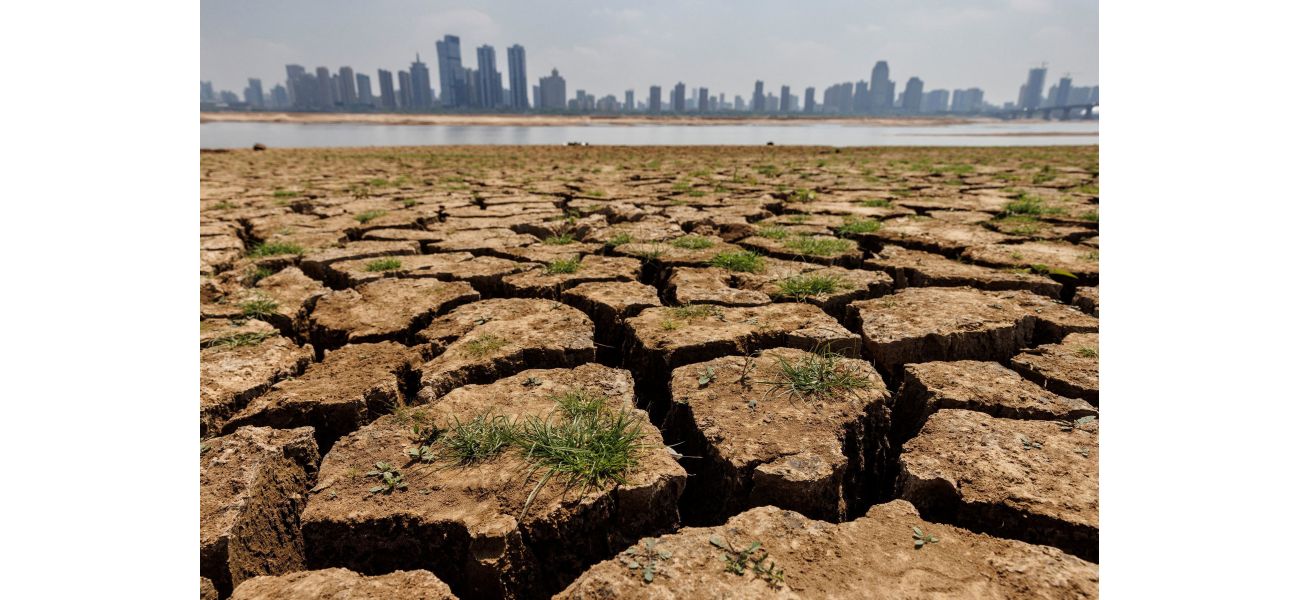The Earth's water movement is out of balance for the first time ever.
Humanity has disrupted the water cycle, causing a growing water crisis that will have severe impacts on economies, food production, and people, as stated in a significant new report.
October 17th 2024.

According to a recent report, humanity has caused a major disruption in the global water cycle, leading to a growing water crisis that will have devastating effects on economies, food production, and human lives. This is the first time in history that such a disturbance has occurred, and it is a result of decades of destructive land use and mismanagement of water resources, compounded by the effects of climate change. The report, published by the Global Commission on the Economics of Water, a group of experts and leaders, highlights the urgent need for action to address this critical issue.
The water cycle is a complex system that involves the movement of water around the Earth. Water evaporates from the ground, including lakes, rivers, and plants, and rises into the atmosphere, forming large rivers of water vapor that can travel long distances. As the water cools and condenses, it eventually falls back to the ground as rain or snow. However, due to human activities, this natural cycle has been thrown off balance, causing widespread suffering. Already, almost 3 billion people face water scarcity, and crops and cities are suffering as the groundwater dries up.
If we do not take immediate action, the consequences will be catastrophic. The report predicts that more than 50% of global food production is at risk, and by 2050, countries could see an average of 8% decrease in their GDPs, with low-income countries facing even higher losses of up to 15%. Johan Rockström, co-chair of the Global Commission on the Economics of Water, and one of the authors of the report, states that we are facing an unprecedented situation where the source of all freshwater, precipitation, can no longer be relied upon.
The report also emphasizes the importance of both "blue water," which refers to liquid water in lakes, rivers, and aquifers, and "green water," which is the moisture stored in soils and plants. While blue water has received more attention, green water is equally essential to the water cycle as it returns to the atmosphere when plants release water vapor, contributing to about half of all rainfall on land. Unfortunately, human activities have led to the depletion of green water sources, such as wetlands and forests, which are critical for storing carbon and helping to mitigate climate change. As a result, climate change is further exacerbating the water crisis by drying out landscapes, reducing moisture, and increasing the risk of fires.
The report also highlights the urgent need for better management of natural resources and a significant reduction in planet-heating pollution. Richard Allan, a climate science professor at Reading University, England, who was not involved in the report, describes the situation as a grim picture of human-caused disruption to the global water cycle. He stresses the importance of addressing this issue through better management and cutting down on activities that contribute to climate change.
To effectively address this crisis, the report urges world governments to recognize the water cycle as a common good and work together to address it. With lakes and rivers that span borders and water in the atmosphere that can travel long distances, the decisions made in one country can have a significant impact on rainfall patterns in another. The report also calls for a fundamental shift in the way we view water in our economies, including better pricing strategies to discourage wastefulness and the tendency to plant water-intensive crops and facilities in water-stressed regions.
Ngozi Okonjo-Iweala, director general of the World Trade Organization and co-chair of the commission, sees the water crisis as a tragedy but also an opportunity to transform the economics of water. She stresses the importance of valuing water properly, recognizing its scarcity, and the numerous benefits it provides. In conclusion, the report urges urgent action to address the global water crisis, emphasizing the need for collective efforts and a change in the way we value and manage this precious resource.
The water cycle is a complex system that involves the movement of water around the Earth. Water evaporates from the ground, including lakes, rivers, and plants, and rises into the atmosphere, forming large rivers of water vapor that can travel long distances. As the water cools and condenses, it eventually falls back to the ground as rain or snow. However, due to human activities, this natural cycle has been thrown off balance, causing widespread suffering. Already, almost 3 billion people face water scarcity, and crops and cities are suffering as the groundwater dries up.
If we do not take immediate action, the consequences will be catastrophic. The report predicts that more than 50% of global food production is at risk, and by 2050, countries could see an average of 8% decrease in their GDPs, with low-income countries facing even higher losses of up to 15%. Johan Rockström, co-chair of the Global Commission on the Economics of Water, and one of the authors of the report, states that we are facing an unprecedented situation where the source of all freshwater, precipitation, can no longer be relied upon.
The report also emphasizes the importance of both "blue water," which refers to liquid water in lakes, rivers, and aquifers, and "green water," which is the moisture stored in soils and plants. While blue water has received more attention, green water is equally essential to the water cycle as it returns to the atmosphere when plants release water vapor, contributing to about half of all rainfall on land. Unfortunately, human activities have led to the depletion of green water sources, such as wetlands and forests, which are critical for storing carbon and helping to mitigate climate change. As a result, climate change is further exacerbating the water crisis by drying out landscapes, reducing moisture, and increasing the risk of fires.
The report also highlights the urgent need for better management of natural resources and a significant reduction in planet-heating pollution. Richard Allan, a climate science professor at Reading University, England, who was not involved in the report, describes the situation as a grim picture of human-caused disruption to the global water cycle. He stresses the importance of addressing this issue through better management and cutting down on activities that contribute to climate change.
To effectively address this crisis, the report urges world governments to recognize the water cycle as a common good and work together to address it. With lakes and rivers that span borders and water in the atmosphere that can travel long distances, the decisions made in one country can have a significant impact on rainfall patterns in another. The report also calls for a fundamental shift in the way we view water in our economies, including better pricing strategies to discourage wastefulness and the tendency to plant water-intensive crops and facilities in water-stressed regions.
Ngozi Okonjo-Iweala, director general of the World Trade Organization and co-chair of the commission, sees the water crisis as a tragedy but also an opportunity to transform the economics of water. She stresses the importance of valuing water properly, recognizing its scarcity, and the numerous benefits it provides. In conclusion, the report urges urgent action to address the global water crisis, emphasizing the need for collective efforts and a change in the way we value and manage this precious resource.
[This article has been trending online recently and has been generated with AI. Your feed is customized.]
[Generative AI is experimental.]
0
0
Submit Comment





